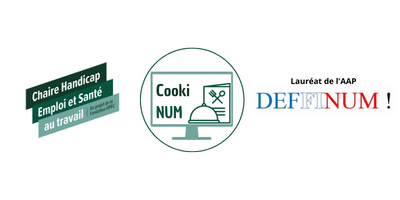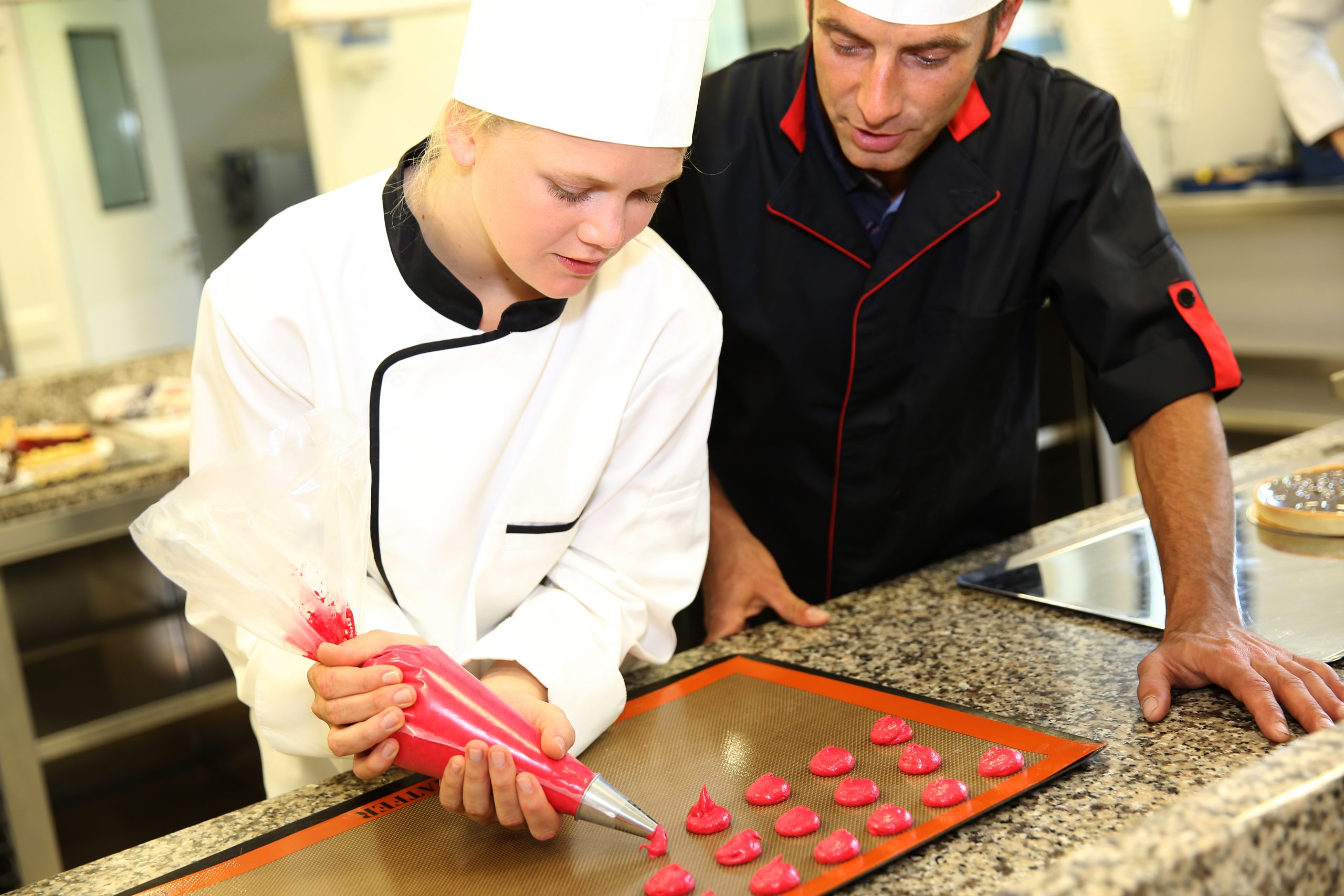The CookiNUM project
THE COOKINUM PROJECT

CookiNUM is a project of operational research and pedagogical innovations to support training centers for jobs in the catering industry, whether traditional or fast-food, in the transformation and digitalization of their training programs (initial and ongoing).
CookiNUM is an ambitious national project aimed at removing obstacles: lack of manpower in the catering sector; lack of attractiveness of the conditions of exercise of the profession and of the possibilities of continuous training; distance from employment of a public in search of activity; siloed pedagogy of the training centers; practical difficulties in meeting the training or employability needs of a mixed public.

Context and objectives of the project
In metropolitan France, in the 2nd quarter of 2021, the number of people registered with Pôle emploi and looking for work (categories A, B, C) stood at 5,688,700. Of these, 3,510,500 were unemployed (category A) and 2,178,200 were in reduced activity (categories B, C). Pôle emploi quarterly statistics (pole-emploi.org). In addition to these figures, there are people undergoing professional retraining (1 in 5 according to a CSA survey conducted in 2021) or wishing to return to work after leaving the workforce (e.g., caregivers, people leaving prison).
Our project : We aim to offer the target audience the opportunity to access a training program and to secure and boost their career path by integrating the food service industry

In the field of employment
In 2021, the hotel/restaurant industry will represent more than 960,000 employees nationwide (excluding 300,000 seasonal workers in the summer), including 740,000 salaried employees and 220,000 non-salaried workers in more than 200,000 companies (OPCO AKTO 2021 figures). This represents approximately 3% of all employees in France. The industry creates jobs and allows France to be one of the world’s leading players in tourism. However, the hotel/restaurant industry has been under pressure for many years. In 2017, according to Pôle emploi, 256,610 recruitment projects were declared at the national level, but recruitment difficulties amounted to 41.30% and seasonal jobs reached 61.20%. The health crisis has amplified the labor shortage.
In addition to recruitment difficulties, there is the loss of staff: the closure of restaurants during the confinements due to COVID-19, forced employees to engage in professional retraining, initially thought to be temporary and became definitive (more than 110,000 departures from the establishments of the branch). Between February 2020 and February 2021, the sector lost 237,000 employees (Ministry of Labor figures). In 2021, Pôle Emploi’s BMO counted 292,000 recruitment projects in the accommodation and catering sector. Currently, more than 100,000 job offers are available and have no takers.
Due to a lack of staff to serve customers, managers of establishments are sometimes forced to refuse customers. The repercussions on the turnover, already weakened by the lockdowns and restrictions is considerable.
In the field of training in the hotel and restaurant industry
According to the Fafih (now OPCO AKTO), 87,363 people were enrolled in initial training in 2016-2017 (39% of whom were apprentices; 55% were enrolled in school-based training). 322 schools and 328 CFAs in charge of providing initial training are present on the territory. As for continuing education, 12,193 candidates were undergoing training under a professionalization contract in 2017 (5,723 of them were at the end of the course). In 2016-2017, nearly 100,000 candidates (of all ages) took a training course to work in a profession in the hotel and restaurant industry.
From the CAP to the master’s degree, there are more than 20 diplomas in this industry. In 2017, most initial training leavers were preparing a CAP diploma (14,621 candidates) or a BAC level diploma (12,441 candidates). Of the 5,723 young people and adults completing a professionalization contract, more than 40% obtained a CQP from the sector’s branches at the end of their training, which is by far the 1st qualification presented. Over the past 10 years, the number of students enrolled in apprenticeship programs preparing for jobs in the hotel and catering sector has been steadily decreasing, in line with the trend observed at national level. The number of candidates in training fell by 9% between 2012 and 2017.
The CookiNUM project was also born out of the urgent need to reduce the unemployment rate in France (twice as high among people with disabilities), to work towards a more inclusive society (people with disabilities, refugees, people leaving prison, military personnel undergoing retraining), and to secure professional reintegration paths (for people who are far from employment or incarcerated).
CookiNum is an ambitious national project whose objective is to remove obstacles, greatly increase the possibilities of exit, employment, and employability, reach a great number of beneficiaries and contribute to the modernization of training centers.

COOKINUM : Innovation for tomorrow’s inclusive learning
To meet the challenges of tomorrow’s inclusive learning in the food service industry, the project relies on three main levers.
1st lever : Digital technology for educational innovation with four digital bricks
| Digital brick | Description |
|---|---|
| CookiNUMmobile | Collaborative and educational mobile application |
| CookiNUMprogram | Web TV |
| CookiNUMskills | Immersive capsules to develop soft skills |
| CookiNUMnetwork | Digital networking of training centers |
The pedagogical innovations made possible by the implementation of these digital bricks enable training centers to better meet the needs of their target audiences in the context of the digital hybridization of their existing educational systems.
2nd lever : Cooperation within a committed and creative CookiNUM community
The CookiNUM community is made up of all the parties involved in the design, implementation and evaluation of the innovations suggested in the field of training for the catering industry. Led by the CookiNUM project team, this community enables its members to co-construct the solutions needed by learners, trainers and professionals by pooling their resources and drawing on their experience and expertise.
3rd lever: Sharing to enhance the attractiveness of the food industry
A wide range of CookiNUM digital content will be available for free access to those involved in the restaurant industry and to the public interested in the profession. In this way, CookiNUM will make the catering industry better known and recognized by the greatest number of people

The training centers involved in the project are : CFAs in ordinary or prison environments, professional schools/high schools in the catering/hospitality sector, Fab Lab Cuisine, ESPO/ESRP, adapted and protected sectors, application restaurants, restaurant rooms of chefs or guest trainers.
The associated partners are : Upec, Université Paris8, CFA, 5Discovery (start-up creators of immersive capsules), Oeuvre Falret (web TV/Culinary Lab), Thales, Microsoft, Social Ministries, Ministry of Justice, Ministry of the Armed Forces, FIPHFP, HandiPRINT, Missions locales IDR, RéseauH, La Fagerh.
In this project of hybridization of existing training, the target public includes people in initial vocational training or continuing education, far from employment, in professional retraining in transition (between a protected environment and an ordinary environment; between a prison environment and an ordinary environment; between a military environment and a civilian professional environment), in self-training, in a project of orientation towards apprenticeship or work-study.
There is a strong mix of target populations : people with disabilities, newcomers, people with language barriers or who are geographically distant from training sites, prisoners or “ex-prisoners”, war wounded or military personnel undergoing retraining, young people between the ages of 12 and 25 who are planning to pursue an apprenticeship or work-study program, (former) family caregivers who are returning to work, and young caregivers who want to take a vocational training course, regardless of the level of their qualifications.
The free access to a large number of CookiNUM contents enables the target audience to be broadened to include any professional wishing to develop his or her skills and knowledge through self-training, any person wishing to develop his or her knowledge and skills before entering training, young secondary school students looking for an internship in the 3rd or 2nd year of secondary school, and/or reflecting on their professional future, any guidance actor (CIO, SCUIO-BAIP, CIDJ, schools, rectorates, regions, student fairs, etc. ) with QR-Codes or links on their websites to give access to the digital tools in free access.
Given the networking of the training centers and the free access, the project has a national (or even international) scope and the target audience can already be estimated in tens of thousands of people trained or informed at a distance.

Networking, with a national focus :
- It is initially planned to be inter-regional with a pilot phase in the first year (5 to 10 training centers partnering in the project).
- From the second year: at least 10 times more poles nationally distributed
- At the end of three years in more than a hundred partner training centers (CFA, ESPO/ESRP, professional schools and colleges in the hotel and restaurant industry)
- That is more than 10,000 people over the 3 years of the project, in addition to the tens of thousands of people accessing the open access resources.
As far as the networking of the training centers involved is concerned, it is planned to be gradual, with a view to thoughtful consultation with the training centers and a gradual evolution of training and work methods. The aim of this gradual approach is to preserve the quality of training and the quality of life at work for all, and to prevent any psycho-social risk or blockage (due to changes in working methods: pooling, use of new digital tools, etc.).
More broadly, the project is developing a methodology that can be quickly transposed to other sectors of activity. The first sector of activity targeted is the hotel industry linked to the catering trade, and the sector of activity of the partner solicited for the AKTO project. Then any other sector, especially in tension, such as the building industry.
In order to ensure the operational efficiency of the networking of the training centers and the methodological transferability at the national level and to other sectors of activity of the pooled digital tools that meet the diverse needs of the target audiences, it appeared necessary to circumscribe the project and not to multiply the sectors of activity. The choice was made to focus on the restaurant industry, which is under pressure, because it also allows us to target the gender mix, a good example and a strong challenge for other sectors of activity.
With the support of :
